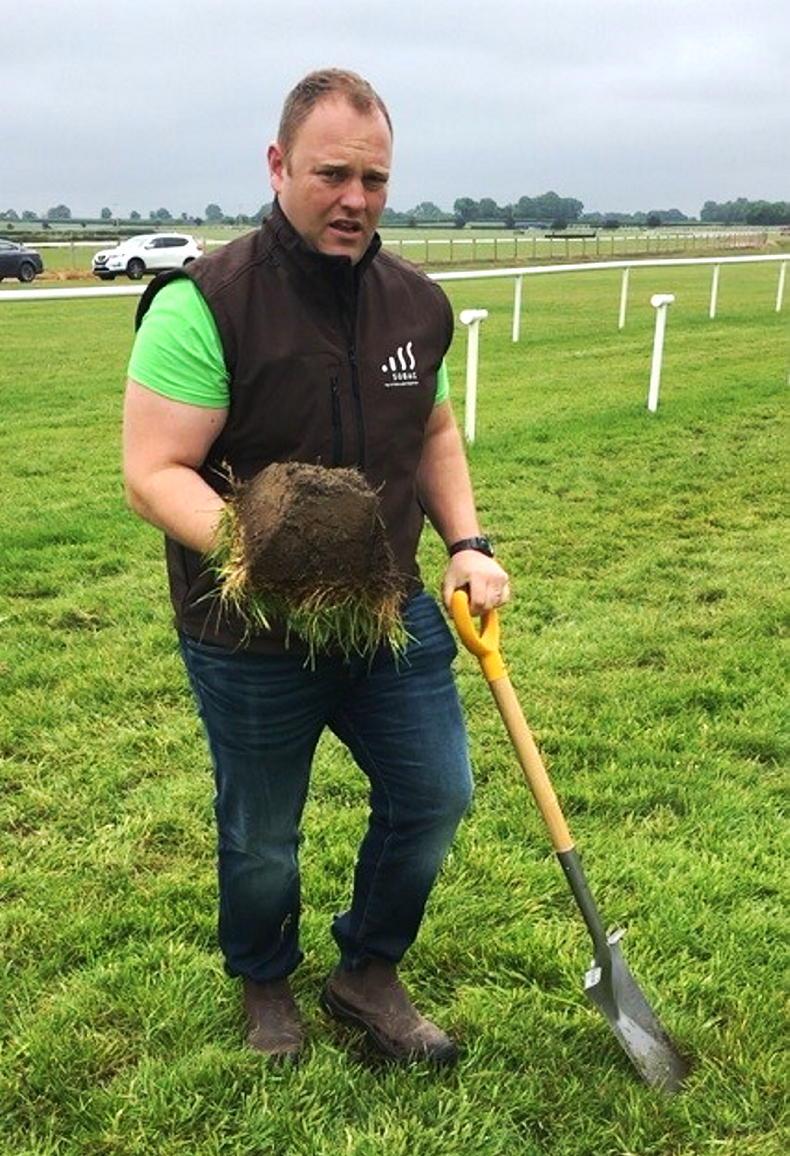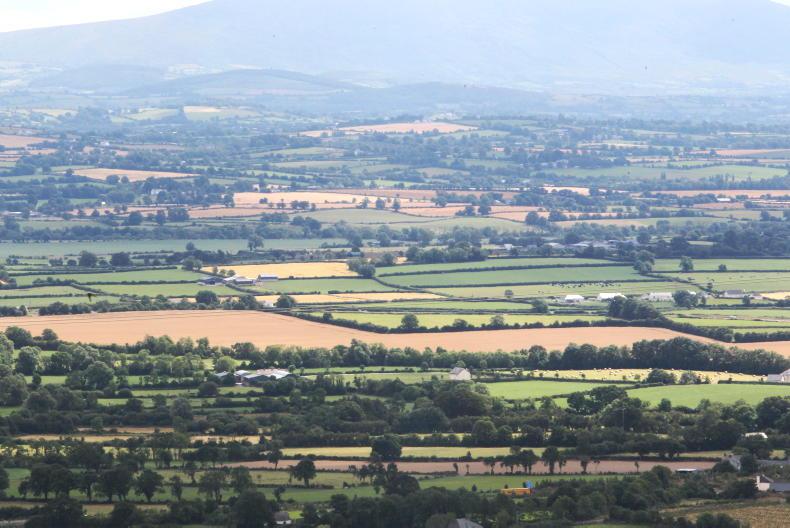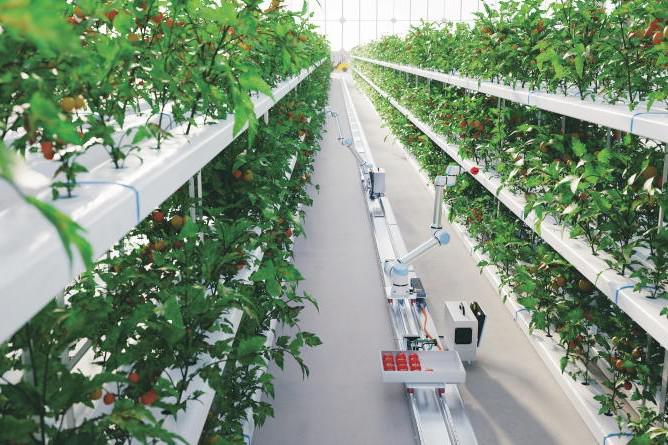Sportsturf management is the science and practice of maintaining high-quality grass surfaces for athletic fields, golf courses, and other sports venues.
This includes soil health management, irrigation, pest control, mowing techniques, and selecting suitable grass varieties to ensure optimum performance and durability under heavy use.
In Ireland, this area is particularly important due to the country’s wet climate, which presents challenges of waterlogging, fungal diseases and soil compaction (the physical degradation of the soil). Effective turf management ensures that playing surfaces remain safe, aesthetically pleasing and adaptable to wear and tear throughout the year.
Sportsturf management offers a range of career opportunities focused on the maintenance and management of sports surfaces and amenities. From horse racing, rugby and GAA to golfing and tennis, any sport played on grass needs management.
Apprenticeship course
Teagasc launched an apprenticeship in sportsturf management in 2023. It is aimed at those looking to pursue a
career in the sector or those already working in the area who want a recognised qualification.
Before the course was launched, the only way to get a formal qualification in this area was to do a degree course or travel abroad, according to Eamon Kealy, sportsturf apprenticeship co-ordinator.
“Looking at the programme, 90% of students have been working in the industry for several years. They wanted to move up the ladder and gain a formal qualifications,” says Eamon.
The programme has 13 modules covering topics such as soil hydrology, which is the use of water and irrigation systems in sportsturf construction.
“We have a module on turf grass equipment, maintenance, operation and set up. A big thing about the equipment used on sportsturf is we don’t use the same type of mowers that farmers would use. Instead, it is cylinder mowers that are very specific in their set-up.
“For the height of cut, we could be down to less than 2mm. The quality of cut, setting up machines, safety and organisation is all very important,” explains Eamon.
If the Government are going to invest in building pitches, we need to have people who are properly trained and qualified to manage and maintain them
With 50 apprentices currently in training across the two years, the course has been in high demand. It caters to various sectors, including golf courses, football pitches, and county councils. The apprenticeship aims to address the industry’s need for qualified professionals, particularly in light of the Government’s sports capital programme investments.
“If the Government are going to invest in building pitches, we need to have people who are properly trained and qualified to manage and maintain them,” says Eamon.
This career is suited to somebody who enjoys doing a job and seeing the work they have done come to fruition.
“The work is very interesting, whether it’s the preparation of a football or rugby pitch before an important match, setting up a golf course or getting the track ready for a big day at Leopardstown.
“That job satisfaction is there because at the end of the day, the work they have done has produced a surface that people generally get good feedback on,” says Eamon.
Irish Country Living spoke to two people working in the industry on their experience to date.
Tom Stapleton: soil.ie
With 14 years of experience, Tom Stapleton is the managing director of soil.ie which distributes biological soil amendments and advises on sports pitch and race track maintenance.
“I’ve always had an interest in the outdoors and nature. Ireland is unique when it comes to amenity sportsturf and growing vegetables – because of our rainfall, we get lots of growth. We’re lucky that we have a mild climate, with good conditions and ambient sunlight,” he says.
The company was established in 2011 with headquarters in Naas, Co Kildare. He began collaborating with SOBAC, which specialises in soil amendments in 2012.
“One element of the business is distributing biological soil amendments, and we also advise on maintenance on race tracks and sports pitches,” he says.
“Our philosophy and approach works in line with the amount of rain we have in Ireland and our weather. If we can get the soil working and root systems growing deeper down, then we can get the soil working in tandem with nature. We can use biology and reduce the amount of mechanical means needed,” says Tom.
According to Tom, when it comes to a sports pitch, the optimum situation is to have the least amount of chemical fertiliser needed to have it looking well aesthetically, but yet functioning at it’s best.
There is a wide variety of job opportunities in landscaping, private enterprises, and maintenance of pitches and surfaces.
Tom advises anyone interested in doing a horticulture degree or sportsturf management course to work for a landscaper or on a golf course for a few months during the summer to see if it’s for you.

Tom Stapleton of Soil Ireland.
Sean Kelly: Kelly Farm
Modernisation Limited
In 1981, Sean Kelly’s family-run business opened in Ballydesmond on the Cork and Kerry border. They started as an agricultural contractor and, diversified into the maintenance of sports pitches.
“I always played football on bad pitches, and I thought someone better do something to improve the surface. When I was in England at a show, we were driving along the road, and I saw a soccer pitch being drained. I went in to look at the machinery, and it started from there,” says Sean.
As a family-run business, they built up steadily over the years, starting on the first pitch in Kilbrean and Macroom. They now manage various sports facilities, from rugby pitches to golf courses and GAA clubs.
Across the business, which has construction and agri services, they employ 50 people and use subcontractors. Some have been with the company for 25 years and they travel the length and breadth of Munster looking after surfaces.
“Distance is no object if there are people looking for you,” says Sean.
“We have all the necessary gear for maintenance, a lot of sand and aeration to decompress the ground and then we do drainage work. We’re seeing sand carpet pitches being built now – there are grants available, so clubs are availing of them,” he says.
Jim Kelly from Fenit, Co Kerry is the agronomist on the team who assesses the pitch. After looking at the whole situation, they decide as a team what needs to be done to the surface.
“Drainage is the most important aspect of it. We then treat the soil with the right applications of fertiliser and lime. You have to look at what turns up in the soil test and go from there,” he says.
With a shortage of workers, there are plenty of opportunities in the sector, according to Sean.
“It’s hard to get a bad fella now, nevermind a good fella,” says Sean.
Sportsturf management is the science and practice of maintaining high-quality grass surfaces for athletic fields, golf courses, and other sports venues.
This includes soil health management, irrigation, pest control, mowing techniques, and selecting suitable grass varieties to ensure optimum performance and durability under heavy use.
In Ireland, this area is particularly important due to the country’s wet climate, which presents challenges of waterlogging, fungal diseases and soil compaction (the physical degradation of the soil). Effective turf management ensures that playing surfaces remain safe, aesthetically pleasing and adaptable to wear and tear throughout the year.
Sportsturf management offers a range of career opportunities focused on the maintenance and management of sports surfaces and amenities. From horse racing, rugby and GAA to golfing and tennis, any sport played on grass needs management.
Apprenticeship course
Teagasc launched an apprenticeship in sportsturf management in 2023. It is aimed at those looking to pursue a
career in the sector or those already working in the area who want a recognised qualification.
Before the course was launched, the only way to get a formal qualification in this area was to do a degree course or travel abroad, according to Eamon Kealy, sportsturf apprenticeship co-ordinator.
“Looking at the programme, 90% of students have been working in the industry for several years. They wanted to move up the ladder and gain a formal qualifications,” says Eamon.
The programme has 13 modules covering topics such as soil hydrology, which is the use of water and irrigation systems in sportsturf construction.
“We have a module on turf grass equipment, maintenance, operation and set up. A big thing about the equipment used on sportsturf is we don’t use the same type of mowers that farmers would use. Instead, it is cylinder mowers that are very specific in their set-up.
“For the height of cut, we could be down to less than 2mm. The quality of cut, setting up machines, safety and organisation is all very important,” explains Eamon.
If the Government are going to invest in building pitches, we need to have people who are properly trained and qualified to manage and maintain them
With 50 apprentices currently in training across the two years, the course has been in high demand. It caters to various sectors, including golf courses, football pitches, and county councils. The apprenticeship aims to address the industry’s need for qualified professionals, particularly in light of the Government’s sports capital programme investments.
“If the Government are going to invest in building pitches, we need to have people who are properly trained and qualified to manage and maintain them,” says Eamon.
This career is suited to somebody who enjoys doing a job and seeing the work they have done come to fruition.
“The work is very interesting, whether it’s the preparation of a football or rugby pitch before an important match, setting up a golf course or getting the track ready for a big day at Leopardstown.
“That job satisfaction is there because at the end of the day, the work they have done has produced a surface that people generally get good feedback on,” says Eamon.
Irish Country Living spoke to two people working in the industry on their experience to date.
Tom Stapleton: soil.ie
With 14 years of experience, Tom Stapleton is the managing director of soil.ie which distributes biological soil amendments and advises on sports pitch and race track maintenance.
“I’ve always had an interest in the outdoors and nature. Ireland is unique when it comes to amenity sportsturf and growing vegetables – because of our rainfall, we get lots of growth. We’re lucky that we have a mild climate, with good conditions and ambient sunlight,” he says.
The company was established in 2011 with headquarters in Naas, Co Kildare. He began collaborating with SOBAC, which specialises in soil amendments in 2012.
“One element of the business is distributing biological soil amendments, and we also advise on maintenance on race tracks and sports pitches,” he says.
“Our philosophy and approach works in line with the amount of rain we have in Ireland and our weather. If we can get the soil working and root systems growing deeper down, then we can get the soil working in tandem with nature. We can use biology and reduce the amount of mechanical means needed,” says Tom.
According to Tom, when it comes to a sports pitch, the optimum situation is to have the least amount of chemical fertiliser needed to have it looking well aesthetically, but yet functioning at it’s best.
There is a wide variety of job opportunities in landscaping, private enterprises, and maintenance of pitches and surfaces.
Tom advises anyone interested in doing a horticulture degree or sportsturf management course to work for a landscaper or on a golf course for a few months during the summer to see if it’s for you.

Tom Stapleton of Soil Ireland.
Sean Kelly: Kelly Farm
Modernisation Limited
In 1981, Sean Kelly’s family-run business opened in Ballydesmond on the Cork and Kerry border. They started as an agricultural contractor and, diversified into the maintenance of sports pitches.
“I always played football on bad pitches, and I thought someone better do something to improve the surface. When I was in England at a show, we were driving along the road, and I saw a soccer pitch being drained. I went in to look at the machinery, and it started from there,” says Sean.
As a family-run business, they built up steadily over the years, starting on the first pitch in Kilbrean and Macroom. They now manage various sports facilities, from rugby pitches to golf courses and GAA clubs.
Across the business, which has construction and agri services, they employ 50 people and use subcontractors. Some have been with the company for 25 years and they travel the length and breadth of Munster looking after surfaces.
“Distance is no object if there are people looking for you,” says Sean.
“We have all the necessary gear for maintenance, a lot of sand and aeration to decompress the ground and then we do drainage work. We’re seeing sand carpet pitches being built now – there are grants available, so clubs are availing of them,” he says.
Jim Kelly from Fenit, Co Kerry is the agronomist on the team who assesses the pitch. After looking at the whole situation, they decide as a team what needs to be done to the surface.
“Drainage is the most important aspect of it. We then treat the soil with the right applications of fertiliser and lime. You have to look at what turns up in the soil test and go from there,” he says.
With a shortage of workers, there are plenty of opportunities in the sector, according to Sean.
“It’s hard to get a bad fella now, nevermind a good fella,” says Sean.










SHARING OPTIONS